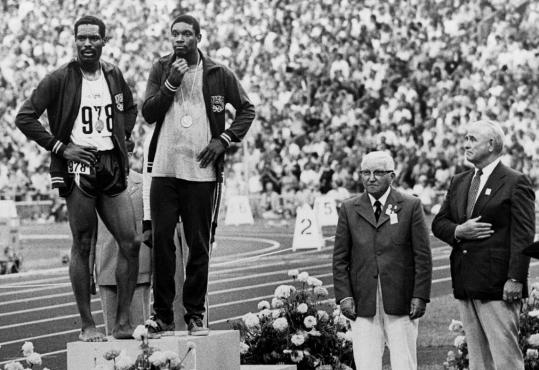They stood there casually, one barefoot, hands on hips, the other in thoughtful repose, right hand stroking the chin. You would think they were waiting for the bus.
But Wayne Collett and Vince Matthews were actually standing on the winners podium at the 1972 Munich Olympics, their medals for their silver and gold medal finishes in the 400 meter sprint around their necks, and the American national anthem playing.
Avery Brundage, the president of the International Olympic Committee, viewed the behavior of Collett and Matthews as abhorrent and immediately banned them from the Olympic Games. This may have seemed like déjà vu to Brundage as he had made the same decision four years earlier in Mexico City, when Tommie Smith and John Carlos accepted their medals after the 200 meter finals, and raised their black-gloved fists into the air, reflecting their anger at the state of race relations in America.
The day after Brundage’s decision to kick Collett and Matthews out of the Munich Olympic Village, a white bed sheet was suspended from the windows of the American team’s dormitory. According to Ollan Cassell in his book Inside the Five Ring Circus, the bed sheet read, “Down with Brundage”. Cassell reveals that the person who dropped this flag of protest was Vince Matthews.
The head coach of the US track team at the 1972 Munich Olympics was Bill Bowerman, the legendary coach at the University of Oregon. With Smith injured and Collett and Matthews suspended, he knew he would not be able to field a 4X400 relay team. Clearly the men would have been a near-lock for gold if not for the suspensions. According to Kenny Moore’s book, Bowerman and the Men of Oregon, Bowerman was upset with the behavior of Collett and Matthews, but he did not believe they deserved to be suspended.
“Matthews and Collett made asses of themselves,” as Bill would put it, “jiving around and talking, giving the impression they didn’t want to be ramrod straight. That was unfortunate but no big deal. I felt they hadn’t meant to be disrespectful during the anthem. Jesse Owens talked with them afterward and felt the same. He was arranging for them to apologize, but before they could, Brundage had Matthews and Collett suspended and sent from the Village.”
“You cannot expect on an Olympic squad of sixty to have everybody act like army privates,” Bill said later. “They’re great athletes. They’re great individuals. The fact that some of them did things that the press objected to didn’t bother me too much. They’re vivid, alive, human animals. They’re keenly interested, very competitive, and all different. So why not accept that and enjoy it?”
So Bowerman said he would talk to Brundage the next day and see if an apology might convince Brundage to change his mind. Bowerman did meet with Brundage, and despite the fact that Palestinian terrorists had just broken into the Olympic Village and taken Israeli athletes hostages, Bowerman and Brundage were able to manage a discussion on Collett and Matthews. And as related in Bowerman’s biography, Brundage accepted Bowerman’s apology on behalf of his athletes and accepted their reinstatement on condition that the USOC agreed.
Bowerman, and his partner in this negotiation, Jesse Owens, rushed to a gathering of USOC members to tell them the wonderful news, that Brundage had actually reversed his decision and that all they needed was USOC’s endorsement. But Bowerman was surprised to learn that more than the IOC, the USOC was even more outraged, and had already voted to support Brundage’s original decision to kick Collett and Matthews out of the Olympics. According to the Bowerman bio, the presiding officer of the USOC, Clifford Buck gave as rationale, “Well, they insulted the American flag.”
And so, Collett and Matthews were suspended and the heavily favored 4X400 relay team never made it on the track.
Years later in 1992, Collett told the Los Angeles Times the following:
“I love America. I just don’t think it’s lived up to its promise. I’m not anti-American at all. To suggest otherwise is to not understand the struggles of blacks in America at the time.’’

